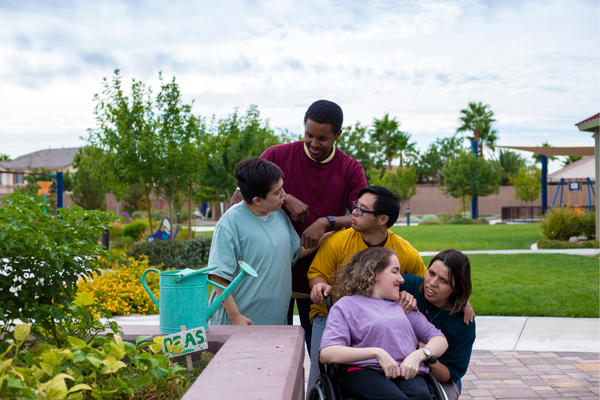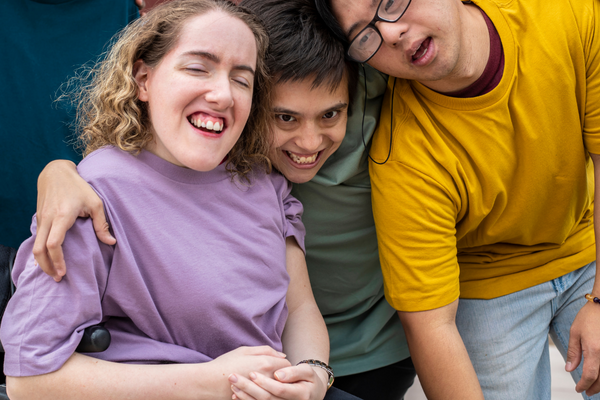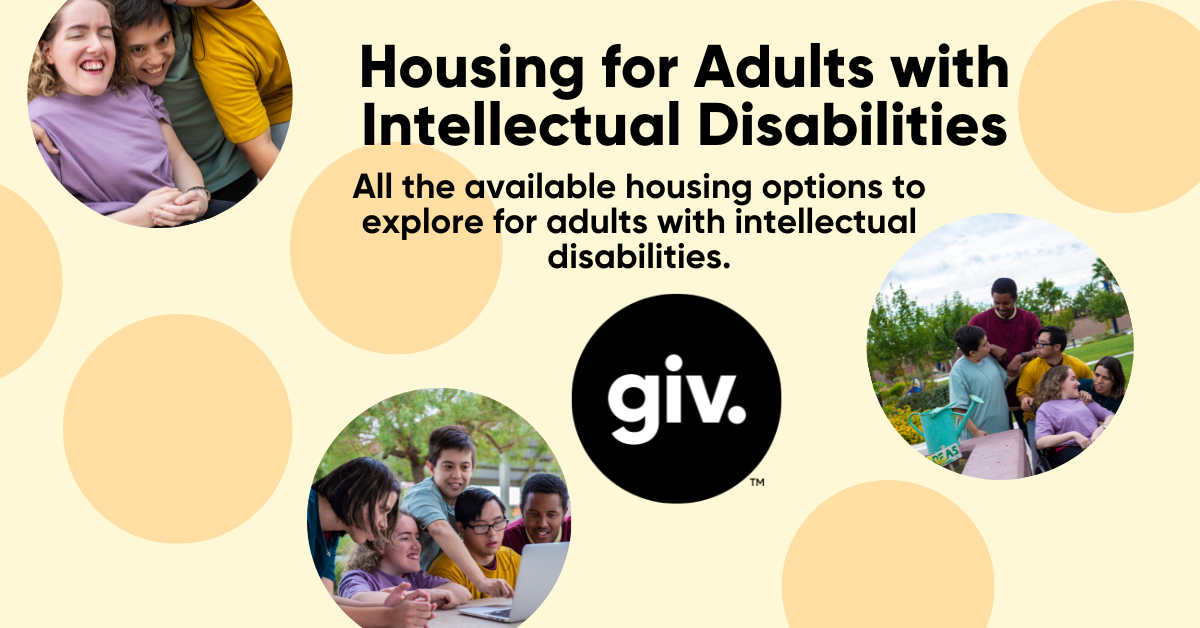There are many different types of housing for adults with intellectual disabilities. If you’re the primary caregiver of an individual with an intellectual disability and are wondering what their housing options will look like in the future, there are six options that families usually consider when starting this process.
6 Types of Housing for Adults with Intellectual Disabilities:
There are six different types of housing families usually explore when looking for the best housing fit for their adult child with a disability. There is no right answer that will work for each family since each individual and their disability are very unique. Our hope is that by sharing these options families will have a better idea of what their futures can look like, and have what they need to make the best choices for their families.
Group Home:
When people hear the term group home most would be surprised to know that these are typically houses that are right within your own neighborhood. Typically these houses are owned by regular individuals who want to start a “business” as a group home. They get their business registered with the state the same way you do any other business. The homeowners get background checks to work with individuals with disabilities along with other trainings they need to provide this care. All staff who also work for this business get background checks and training as well.
The group home owners and staff are paid for their caregiving time by medicaid funds that are budgeted to each individual who lives in the home. It’s typically a day rate per person paid by medicaid to the group home owner.
The individuals that live in group homes typically have their own bedroom, don’t require a very high level of care, and the staff might only be in the home from breakfast to dinner time each day. This might be a great option for someone who is fairly independent and desires to live outside their family home, but still requires some level of support throughout the day.

Assisted Living Facility:
Assisted living is where the individual might have their own apartment or cottage within a large complex of other individuals who also have disabilities. In these situations someone comes into their home each day and helps with self-care, feeding, medications, and anything the individual might need help with. These types of accommodations typically provide a higher level of care and assistance than a group home is able to provide, while still having some independence for the individual.
Apartment within Family Home:
Some families might want to continue being the main caregiver for their loved one while still providing some independence at the same time. In these circumstances, families may explore turning part of their home into an apartment for the individual in question. This could be a small in-law suite with a bedroom, bathroom, and small kitchen, or it could be an entire basement apartment. In some counties you may even be able to build a small tiny home on your property for the individual to live in as well.
This allows mom and dad to continue providing care while still providing independence at the same time. With giv.care we’re able to help parents who want to be the primary caregiver receive payment and funding on a weekly basis for caring for their loved one through Utah’s current caregiver compensation. If you’re currently receiving DSPD benefits, this might be a great option for you to explore that allows you to be paid for work you’re already doing.

Independent Living:
Some individuals with disabilities might be able to live fully independent lives. In those cases you could look for small houses/condos/apartments nearby that can provide them with independence while also having supports they need. Things to consider would be transportation availability, access to stores, food, and restaurants, and accessibility accommodations the individual might need. Caregivers can still come in and out of their home to provide support as needed. Caregivers for giv.care can still provide support to these individuals in their homes as needed.
Host Home:
Host homes differ from group homes in many aspects. Group homes can have changing staff constantly coming in and out of the home, and the other individuals receiving care within the home can change a lot as well.
With a host home you typically have one family that is providing care for the individual with a disability, and that person with a disability is the only person in the home receiving care from the host home family. The host home family is paid by medicaid to provide this care for the individual. Host homes are often more personal and provide more consistency and less turnover for the person receiving care.
Skilled Nursing Facility:
Skilled nursing facilities or nursing homes are typically seen as a last resort option in most circumstances. This would be for individuals who are not able to have much independence, need around the clock medical care, and the families are not able to provide 24/7 care for their loved one any longer. While a skilled nursing facility can certainly be the right fit for a lot of people, insurance usually wants to make sure all other options have been exhausted before this option comes into play.

Living at Home:
Finally, the last option is living at home. With this model the individual stays living in their family home with mom and dad, or siblings, or other family members. If the other people in the home have jobs and are unable to be the main caregiver 24/7, Medicaid budgets can be used to pay caregivers to come into the home and be with the individual while mom and dad, siblings, or other family members work.
At giv.care a majority of our hired caregivers provide this level of care to families. We have a mobile app that allows the person in charge to schedule shifts, the caregiver accepts shifts within their app, and then heads to the family’s home to provide care for the individual. Caregivers are paid $24/hr weekly for the care they provide.
It can be overwhelming when you’re trying to explore these housing options for adults with disabilities the first time. It’s good to remember that nothing is permanent and you can try a variety of these options until you find the fit that will work best for you.







One response to “Housing for Adults with Intellectual Disabilities”
Looking for a group home situation in Alabama for a 37 yr old male.